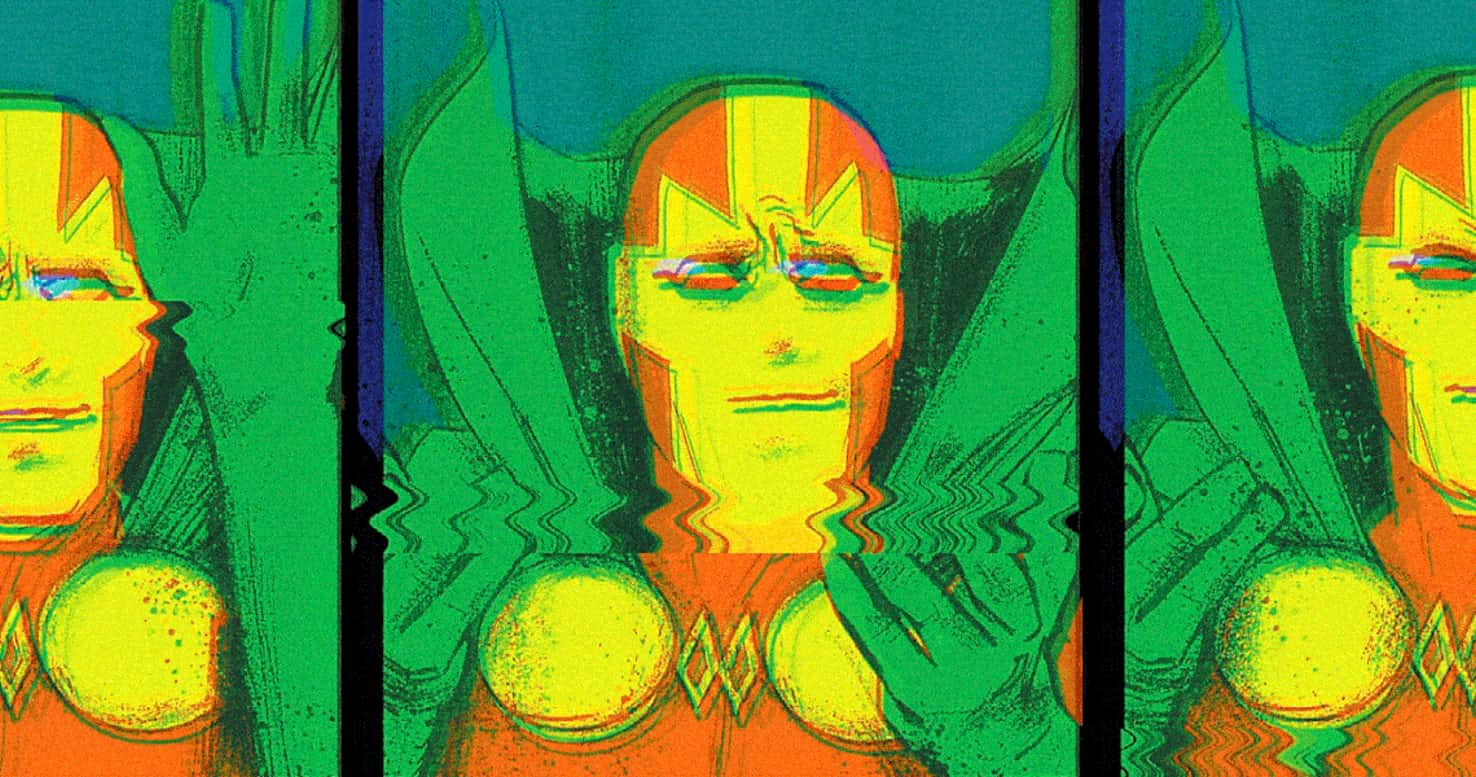
Kyle: I assume you are now at the point where you finished Mister Miracle number 12. Is that done behind the scenes are you both working on that now?
Gerads: I just finished issue 10. And I’m working on 11 right now.
Kyle: Cool, what’s happens in it?
King: *laughs*
Gerads: Well played.
King: It wouldn’t even make sense if you didn’t know what happens in 10.
Kyle: I know, I was supposed to know what happens in 10, but we didn’t get our review copies yet. I think it’s been pushed back.
King: Aw that’s too bad, 10 is beautiful, man.
Kyle: I’m excited to read it for sure. One of the things that I wanted to really nail down with you guys is the fact that it seems like you’re getting more and more simpatico as a team. I feel like you guys are in your Brubaker/Phillips mode now, and I’m wondering how your close working relationship has evolved over the past couple of years.
Gerads: I feel like Sheriff of Babylon kind of clicked immediately, as hype as that sounds, it did. And we’ve been kind of running that same amount of quick the whole way through. He (King) is the godfather of my child now. So we amped it up a little bit.
Kyle: This is your first?
King: You had a kid! That’s the biggest change. I’ve always had these three horrible children. You have one child, now we have a different level to relate at.
Kyle: I was going to ask about children actually given where the second arc seems to be going with fatherhood as a key theme and Scott’s becoming a father and a couple of other moments where Scott has to balance his job as Highfather with being an actual father. How much of that is pulled from personal experience?
Gerads: So this is a question I’ve always wanted to ask Tom. With Mr. Miracle, was it always intended to go this route or if it did because of life experiences?
But, for me, everything that’s happened in Mister Miracle, it’s almost become like this weird fictional autobiography. Issue 7, which is the birth issue, I drew that a month after I went through it, so it was very fresh in my mind and then reading Tom’s script, it reflected a lot of my own experience. And then issue 8 was all about raising the kid for a year. I’m doing that right now. It’s just continuing to ride that wave.
Kyle: It seems like it’s more like your biography.
Gerads: Yeah, but at the same time with issue 8, it’s all about raising their kid for the year but also I think, the bigger theme was: how do you be a good dad and also be a good soldier? which relates to Tom more.
King: The themes in my comics change, like when I did The Vision, Sheriff, and Omega Men, that trilogy. I feel like all three of those books are the same book and it’s all about a guy who’s trying to do well and it all falls apart about him, and it’s just very thematically consistent for the three of them. Then I have this like nervous breakdown in 2016. And since then I’m writing more about…rather than how you fall apart how you put yourself back together. I’m of that generation where our fathers walked away from their families to put themselves in crises. That was the big thing in the 80s and 90s like “oh let’s go wild, get a ponytail, buy a car and drive away.” And rather than in my generation, I feel like in grandparent’s generation comes from a different approach to those crises which was kind of like “embrace your family and use that as your strength rather than to run away from it.”
That’s when I kind of wanted to write about how my family helped me rebuild myself, and I feel that’s what both Batman and Mister Miracle have been about. So yeah, that was always the plan. The fact that you always have to write for your artist and the fact that Mitch is going through all these things it makes it easy to lean into. That’s the easiest decision to make.
Kyle: You’re basically teeing up my questions for me, because I think the theme of family and how it shapes the person you are screams out at me when I read Mister Miracle; especially if we consider the nature vs. nuture debate…ie: the man Scott was raised to be vs. the man he’s actually become. How much of that is intentionally baked into the book, especially with Darkseid now trying to cut a deal with Scott regarding his own child?
King: Yeah. I mean the essential conflict here is that Scott had this horrible childhood and his father made this horrible decision and he’s been running from that, he’s literally escaping from that. That is his super power… he has been trying to escape from that challenge, from those moments, from that pain, his whole life. And now he’s coming to a place where he can’t run from it anymore and he has to look at it in the eye. He has to start to understand what that pain is, where it comes from, and how to deal with that. And part of that is understanding the decision his father made in letting him go. And that’s always been incomprehensible to him, as it would be for anyone. Why would your father, who was the god of good, who literally by doing something is good, give you to the devil to be tortured. How do you comprehend that? Scott could never even think about that, and now he has to make that same decision and suddenly he has to see if he can have empathy towards his father who did this to him. And what that does to him psychologically.
Kyle: Given the heavy psychological bent, was this internalized take on the traditionally bombastic Kirby mythos a challenge to pitch?
King: No. I mean, this famously was a consolation book. This was editorial apologizing to us. Mitch and I originally were going to do “The War of Jokes And Riddles” together which eventually ended with Mikel (Janin) in the main Batman book. And it was going to be a 12 issue crime series like The Wire, but of comics. And they decided to move that whole story into Batman proper and it became something different, about Kite-Man and such. And so suddenly Mitch and I didn’t have a book. And then I went to Dan and said “we don’t have a book, give us anything, just something to work with”. And Dan and I got super drunk together in Baltimore and he was like “you could have Mister Miracle or the Atomic Knights, either one.” And I said “Ah! Mister Miracle!” And that’s how it started, and since then I don’t think we’ve gotten one editorial note…oh, we’ve got one – they didn’t let us use pee (in issue 9).
Kyle: My partner and I were debating, “was that urine or was that saliva?”
King: It was originally urine. And they changed it to saliva!
Gerads: And originally the birth was a lot more graphic.
Kyle: Ah! Like Miracleman!
King: Yes, originally the birth was a Miracleman dedication…but it came out better this way, I think.
Kyle: Mitch, let me ask you about your dramatic pacing, as it’s really one of my favorite things about your work. I love how you play with the nine-panel grid in a sort of static style, especially when conversations are occurring. Now does that come from Tom’s scripts or is that really for your invention as a way to parlay the structure dramatically?
Gerads: One of the things about Mister Miracle, was when it first started out we kind of fell through the editorial cracks a bit. He’s not a super popular character. I was kind of left alone and I developed my own unique visual and pacing, and all these things that I wanted to do that I don’t think I could have done under more a more scrutinizing eye or more popular character. And so one of the things I did…I’ve always been obsessed with storytelling from things like Garfield or Calvin and Hobbes. It always just seems so easy to read to me, and you can play off so many jokes and many dramatic reveals, just moving characters in a space. So that’s kind of what I’ve tried to bring to Mister Miracle.
Kyle: It creates a nice sort of filmic feel…
Gerads: Sometimes, there’s a couple fans on Twitter that might tell me I’m lazy because it’s you know repeating back and stuff, and that’s fine. The thing I always want to tell them…I don’t… but what I always want to tell them is: “imagine a movie. And that same scene is playing out. Imagine that camera moving nine times, you’d throw up.” That camera is gonna stay there and play it out.
Kyle: Okay, last question Who is coming up with all of the nice t-shirts that Scott wears, and especially the awesome I Am God mug.
King: That’s all Mitch. I do nothing…do I participate in this book?
Gerads: The whole impetus of that started when I did The Punisher. In Issue #2, I put him in a Hawkeye shirt and then in Punisher #3. I tried to put them in something else and editorial was like “no, stop it with these shirts. We didn’t like it the first time you did it.” And so with Mister Miracle, I was like, “I’m going to do the shirt thing!” So, he just wears a new shirt each scene, and each new day.







Comments are closed.